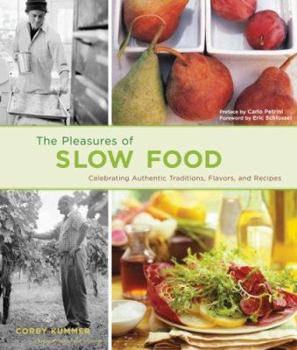The Pleasures of Slow Food: Celebrating Authentic Traditions, Flavors, and Recipes
Select Format
Select Condition 
Book Overview
Originally published in 2002, this was one of the first books on the Slow Food movement. We are offering this wonderful volume in paperback for home cooks who strive to preserve the traditions of... This description may be from another edition of this product.
Format:Paperback
Language:English
ISBN:0811863824
ISBN13:9780811863827
Release Date:April 2008
Publisher:Chronicle Books (CA)
Length:174 Pages
Weight:2.10 lbs.
Dimensions:0.7" x 9.0" x 10.7"
Related Subjects
Cooking Cooking Culinary Arts & Techniques Holiday Cooking Regional & InternationalCustomer Reviews
3 ratings
Very Good Essay on Slow Food. Little use as a cookbook
Published by Thriftbooks.com User , 19 years ago
`The Pleasures of Slow Food' is edited by Atlantic Monthly editor Corby Kummer in that the half of the book contains recipes collected from European and American chefs prominent in the Slow Food movement. The first thirty pages of the book are taken up by a preface written by the founder of the Slow Food movement, Carlo Petrini, a Foreword written by Atlantic Monthly colleague (and author of the best-selling `Fast Food Nation') Eric Schlosser, and with an essay by the author on a description of the history and activities of the Slow Food organization. Eleven (11) essays take up the next fifty pages on various artisinal food producers. After the recipes is a very nice two-page table of contacts for the Slow Food movement in Europe and the United States and for contributors to this book. The most important question to a prospective purchaser of this volume is `Do I want to shell out $40 for a collection of recipes by Rick Bayless, Deborah Madison, Alice Waters, Judy Rodgers, Paul Bertolli, Daniel Boulud and ten other notable American and European chefs'. The question becomes more acute if you, like me, already own twenty cookbooks by these contributors. I will soon point out some observations that make this decision even easier. The `Slow Food' moniker for Carlo Petrini's movement is really a serious misnomer, as the primary objective of the movement is not as an adversary to MacDonalds, even though the projected startup of a MacDonalds at the base of Rome's Spanish steps was the precipitating act which set the movement in motion. As Allison Janney's character C. J. Craig said in a `West Wing' episode, `We need an enemy on this issue'. Fast food restaurants are not so much evil in themselves as, like Gresham's law, they threaten to drive out the things which this movement wishes to preserve. These valuables are artisinal foods and methods, most of which have been used and practiced for centuries, and are in danger of disappearing as much through the action of large food processors and government regulations as they are by the presence of a McDonald's in Rome. This is not to say Fast Food is not evil in its own right, as Schlosser points out, a typical fast food hamburger is a virtual soup of overprocessed, underflavored, artificial ingredients with an unpleasant aftertaste. But this is really a different battle than the preservation of valuable food traditions. The Slow Food movement was founded in Italy, which still has the largest participation. In the early years of the movement, the leading country outside of Italy was Germany. France came to the table very late, and in the last few years, membership in the United States has been leading the charge alongside the Italians. This is largely due to the synergy between the movement's objectives and the vision of American culinary leaders such as Rick Bayless, Deborah Madison, Alice Waters, and Waters' apostles Judy Rodgers and Paul Bertolli. The movement has three principle initiatives. These ar
join slow food usa
Published by Thriftbooks.com User , 21 years ago
I recommend this book to anyone who is worried about the unhealthy dominance of fast food and global agribusiness in the world today. This beautiful tomb, while not sponsored by Slow Food, heighlights a number of families around the world, who are sustaining the production of foods that give us choice in the marketplace, and a foothold against those who produce products that look great , ship well but are without taste.Bravo, Atlantic Monthly for promoting this most profound Slow Food movement that is reawakening us to the politics and business of food. Buy this book, look at slowfood.com, and buy locally grown and artisan foods .
Well-written (and beautiful) book on important movement
Published by Thriftbooks.com User , 21 years ago
I think that "The Pleasures of Slow Food" is a remarkable book with something for everyone. You can enjoy the engaging stories of farmers, food artisans and cultural preservationists from around the world, written in Kummer's delightful manner. Alternatively you can relish in the sheer beauty of the photography. It's even a cookbook if you want to try the recipes of world reknown chefs. But what I liked best was the understanding I gained from it about the Slow Food movement. I'd never heard of it before. When I bought the book I thought it just referred to slow cooking. Instead it is a truly important effort that combines the fight against the loss of traditional ways of growing and preparing foods (as big business assumes more and more control of agriculture) with the desire for healthy, realistic (and delicious) alternatives to a fast food, high fat diet. Who knew you could join a movement that was both making the world a better place while allowing you to nurture your palate? Rush to get this book and to support what it represents.





